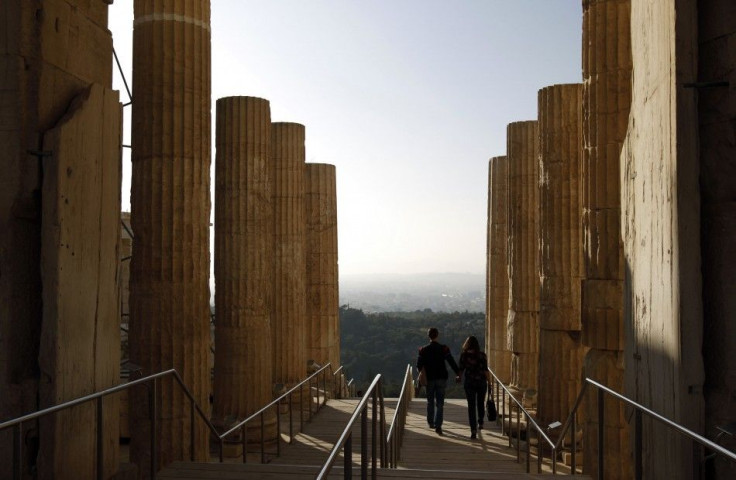A Greek Tragedy: Why Not Visiting Greece Makes Things Worse

A trip to Greece in the coming weeks may feel like an intrusion -- a sojourn into a land of private grief and public fury.
Sitting on the beach in Corfu or sipping wine at a tavern in Athens as the Greeks play out their very public crisis -- come what may -- is likely to make any foreign visitor feel a bit guilty, a bit helpless and, perhaps, unwelcome.
That's not what the Greeks want, of course. It's not what they want at all.
Tourism has long sustained Greece and despite -- or perhaps because of -- its problems, the nation had an astounding year in 2011. A record 16.5 million tourists visited last year, and revenues rose by 10 percent to 10.5 billion euros. Industry officials pinned the success to political turmoil in rival destinations like Tunisia and Egypt, but it's likely that dramatically lower fares were a major factor.
This year, however, things aren't so sunny. Tourist receipts for the first quarter tumbled by 15.1 percent, the Bank of Greece said, while Greek airport arrivals fell 5.1 percent in the first five months of the year. Meanwhile, online hotel prices in Greece show an 8 percent decline this month compared with June 2011, according to Trivago.gr, with rates in Athens down by 22 percent over last year. Overall hotel rates in Greece now average just 100 euros for a twin room, considerably lower than most other European nations.
The prices have gone down everywhere, said Emmanuel Christodoulakis of the Greek National Tourism Organization. You can find so many specials on the hotels and restaurants. There is much more affordable tourism in Greece right now.
Christodoulakis said he's not worried about the currency and believes now is a better time than ever to go to Greece. He acknowledges that Greece has seen a dip in numbers this year but puts the blame on money-strapped Europeans weary of traveling.
Travel agents in the U.K. and Germany have offered steep discounts to help kick-start slumping demand as the economic crisis hits travel spending across Europe. Residents of the two nations account for a large percentage of Greece's visitors, but reports of anti-German sentiment and the fear of being stranded amid protests has left several would-be visitors leery. Many of the 2.2 million Germans who holidayed in Greece last year appear to be headed for other destinations like Spain or Turkey.
London-based Olympic Holidays, a major seller of Greek package holidays in the UK, reduced its rates by up to 25 percent for peak season travel in an attempt to get Brits out on the Greek Isles.
Still, it's unlikely Greece will come anywhere close to last year's numbers.
We will see a considerable drop in tourism income, the head of Greece's tourism enterprises association SETE, Andreas Andreadis, said last week. He put the number between 10 and 15 percent.
Tourism is vital to the Greek economy and accounts for about 15 percent of output and one in five jobs -- this in a country where unemployment has hit a record high of 21 percent.
Tourism officials in Greece hope to lure travelers from Russia, Ukraine and Israel to help make up for the loss from Western European markets. They blame negative publicity in Western Europe and the Americas for distorting the country's image.
The immediate result is the devaluation of our country in the international tourism market, the head of the Hellenic Association of Tourism and Travel Agencies, Giorgos Telonis, told Athens-based ekathimerini.com.
The National Tourism Organization just launched an initiative using social media to respond to inaccuracies or speculations that may have soured people's opinions. The tourism body has invited social media savvy English speakers to join its True Greece campaign to highlight their positive experiences.
But the final insult may be closer to home: a collapse in domestic tourism.
Greek travelers make up 25 percent of the all-important sector, yet even those that continue to travel have less money to spend. Most state employees have seen their salaries slashed as the government races to reduce the largest debt-to-output ratio in the euro zone.
And then there's the concern about the currency. Nobody knows what will happen this Sunday, so most Greeks are keeping what money they have left.
With all these absent tourists, Greek employees' wages and hours have been cut, further derailing the economy and feeding the downward economic spiral.
All the while, the massive marble columns that blanket so many hills in Greece serve as a reminder that fortunes are fleeting. But so too are tragedies.
© Copyright IBTimes 2024. All rights reserved.












